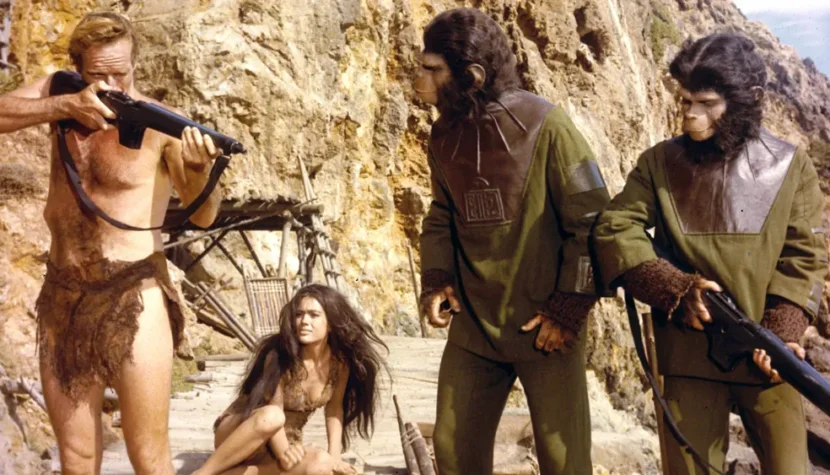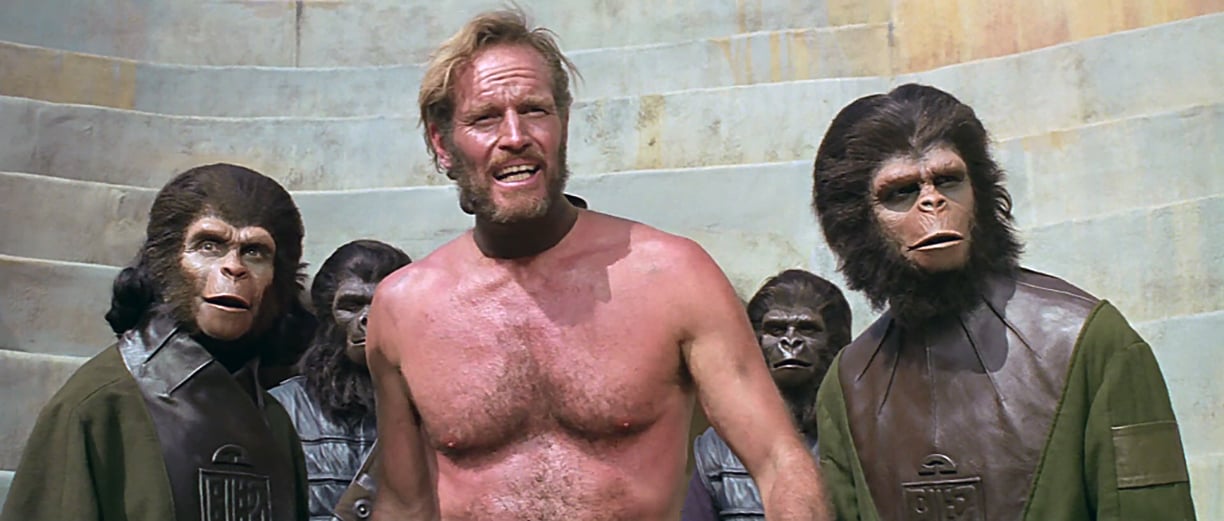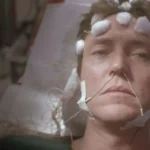PLANET OF THE APES. Still an excellent science fiction film

Planet of the Apes is one of two science fiction films that premiered in 1968 and still remain in the memory of moviegoers worldwide. The other, of course, is 2001: A Space Odyssey. In addition to the premiere date and success among critics and audiences, they are also connected by the fact that both exist in literary form.
However, the difference is that the literary Odyssey was created simultaneously with Kubrick’s screenplay and was released shortly after its premiere, while Planet of the Apes – the book – arrived on store shelves a few years before the film’s release. Its detailed content is significantly different from the cinematic version and is closer to the later 2001 version, but the main plotline, involving astronauts landing on an unknown planet ruled by intelligent apes, remains untouched.
The film version also differs from the literary one for practical reasons. In the book, the ape city is technologically advanced, while in the film, due to technical limitations, their civilization is more reminiscent of human ancient times. Paradoxically, this worked well for the film, as it would be hard to imagine apes flying around with jetpacks. Not only in this aspect was it helpful; when the three male astronauts land on the unknown planet, a third of the film begins, focusing on their exploration of the unfamiliar. The protagonist, Taylor (Charlton Heston), is portrayed as a complex character rarely seen in today’s popular cinema. Heston plays a character who leaves Earth without remorse, almost a misanthrope who dislikes humans, and as the film develops, he explores his own humanity. Taylor is not devoid of humor, distance, and sarcasm.

Sarcasm is present throughout the film, not just from him. The first thirty minutes of the Planet of the Apes are probably the best. The desolate, harsh terrains encountered by the characters create an almost post-apocalyptic atmosphere, generating suspense, and when the apes finally appear on screen, their impact is doubled.
It is worth noting that the portrayal of madness in this situation is enhanced by Jerry Goldsmith’s excellent soundtrack, which is both unsettling and exotic.
With the revelation of the apes, we have the first of two major action scenes in the film. It should be mentioned that both the action scenes and the entire film are flawlessly directed. This is partly due to the somewhat underrated and slightly dusty history of Franklin J. Schaffner, who later directed the Oscar-winning Patton (1970). However, it should not be forgotten that the film would not have worked as well, or perhaps not at all, without the innovative makeup method of John Chambers, which convinced the Fox studio executives to greenlight the production. Thus, despite the last two films in the Planet of the Apes series, Genesis and Evolution, which used computer-generated imagery and performance capture and are equally impressive, the 1968 version remains convincingly powerful.

Related:
The next two acts of the film, when Taylor falls into the clutches of the apes and, for much of the time, due to a fatal shot to the throat, cannot speak, also have their highlights. Among them is the famous moment when the astronaut, finally, after a long time, speaks aloud, surprising the ape civilization. The key here is the play of the screenwriters with the audience’s expectation of when the words will be spoken, and they are uttered when no one expects it and when, as it turns out, they are most needed and appropriate. Planet of the Apes is a film rich in interesting dialogues and ideas. The ape society is led and manipulated by high-ranking orangutans, who hold the rest in check and prevent the astonishing truth about the planet’s past from being revealed. Taylor finds himself in a dramatic situation reminiscent of horror (the film itself has a tone similar to episodes of The Twilight Zone), helped by two chimpanzees, Zira (Kim Hunter) and Cornelius (Roddy McDowall).
Schaffner’s film is, of course, a political commentary on communism, but a commentary that is so refined that it doesn’t hit anyone over the head, unlike many earlier or later science fiction films.
This is because Planet of the Apes is at its core an adventure film, an action film that talks about something incidentally, without beating anyone over the head with its comments. It may not be on the level of the mentioned 2001: A Space Odyssey; it may not be as demanding or forcing its audience to analyze and interpret, but it is certainly one of the best science fiction films of the sixties and, above all, an example of brilliant makeup work.





